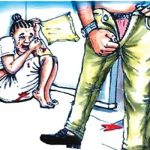LIKE other organisations and societal institutions, the church has been feeling the telling effect s of the coronavirus disease, officially declared as a pandemic and named as COVID-19 by the World Health Organisation. The health challenge that reared its ugly head at the tail end of last year in far away China has dramatically altered people’s modes of social interaction everywhere in the wide world. The handshake, the warm embrace, the peck on the cheek, the high five and otherways of expressing affection, have suddenly become dangerous. The microscopic organism has not only redefined the way of life of all humans, it has also been ravaging every part of the world. No facet of life – social, economic or religious – is spared. The church that is seen as a sanctuary to where people throng to seek deliverance and pray for solution to their problems suddenly became a source of danger from where the faithful had to keep a safe distance in their own interest.Any form of congregation became and remains a serious risk.Restriction became the order of the day in most areas of human endeavour. The gregarious in disposition began to see wisdom in the habit of the solitary.
The synod is an annual assembly of the clergy and the laity during which the past is reviewed and projections are made for the future. The timing and duration of the synod has always been the exclusive business of the church in which the government does not interfere.The year 2020 synod of the Anglican Diocese of Ibadan was, in keeping with long-standing tradition, scheduled to hold in the month of April but the incursion of the virus changed the situation and compelled a postponement sine die. It was the relaxation of restrictions by the Oyo State governmentthat made it possible for the Diocese to hold its synod from the 3rd to the 5th day of July. The synod was unique in several respects. It was meticulously planned andably hosted by the Cathedral of St. James the Great, Oke Bola, Ibadan in strict compliance withCOVID-19 protocols. In addition to the usual synod materials, a face mask and a bottle of sanitizer were included in the conference bag of every delegate. Provisions were made for hand washing at strategic points, physical distancing was strictly observed in the seating arrangement while every delegate had their temperature checked at every entrance to the church. The usual fanfare that,as a tradition, add colour to the opening formalities was absent at this year’s synod.
The menace of the coronavirus did not, however, alter the focus of the synod. Both spiritual and secular issues were subjected to exhaustive discussion and valuable ideas were generated.The Bishop’s Charge is one major event to which delegates look forward with eagerness at the synod because it is always a riveting presentation that critically examines religious and secular issues and proffers constructive suggestions on current issues. While delivering his charge at the last synod, the bishop of the diocese, The Most Reverend Joseph Akinfenwa, wondered why humans had continued to be tormented by viruses. His argument was that if the theory of evolution were true, by now there should be no viruses again. ‘’Whatever made apes to evolve into humans should have also made viruses, which are the lowest living things known to science, to evolve into higher organisms by now.’’He contended.
The bishop recalled that four years ago, the synod lamented Nigeria’s dependence on oil . He remarked that it was a big shame that when the oil bubble finally burst, it met Nigeria unprepared. He said the coronavirus crisis had precipitated another plunge in oil prices and the country was again unprepared. He counselled a redirection of energy towards a productive endeavourto bring about the necessary change from the present situation in which the country had remained chronic consumers. He said Nigeria must reduce, if not eliminate, rent-seeking behaviour, rise above its systemic limitations and do what it should to compete in the knowledge economy. ‘’A nation addicted to consumption of imported products and services, that has little or nothing to export, must suffer the kind of fate we are suffering. .. Let us become a more productive people. Let us look away from crude oil and develop other sources of national wealth.’’ he added.
Bishop Akinfenwa commended Governor Seyi Makinde for making education one of his priorities, stressing that any society that failed to place premium on education was sitting on a time bomb. He advised the governor to avoid the politics of exclusion which, he said, depleted the ranks of the last administration and swelled the ranks of the opposition.He urged the governor to steadfastlyshun the politics of ‘’come and chop’’ andrun an inclusive government by carrying along as many people as possible, opposition members inclusive. He described the prompt payment of workers’ salaries by the state government as commendable because of its ripple effects on the economy of the state. The synod considered motions on issues that were both religious and secular and called on the government to take urgent and decisive steps to check the incessant and mind-boggling cases of rape, kidnapping and banditry and the unceasing atrocities of herdsmen in different parts of the country. It was a synod of perspectives on the church, the polity and the pandemic.
- Olatoye, a veteran journalist, lives in Ibadan
YOU SHOULD NOT MISS THESE HEADLINES FROM NIGERIAN TRIBUNE






